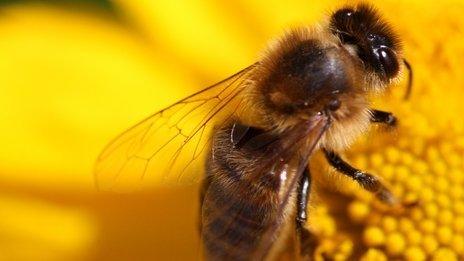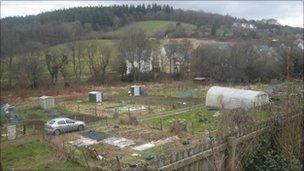Welsh bee decline action plan to promote allotments
- Published

Ministers say the loss of bees is 'real threat' to wildlife and food production
Encouraging green spaces, gardens and allotments to boost Wales' bee population is part of a new action plan to halt a fall in numbers.
Welsh ministers want to see more effort to link up flowering habitats across the countryside from gardens to farms.
The value of pollinators to the UK government is estimated to be £430m a year, but populations have been on the decline for 30 years.
Public consultation on the draft plan , externalwill last until 4 June.
The Welsh government said at the Royal Welsh Show in Powys in 2012 that it would produce an action plan to protect endangered insect pollinators - such as honey bees, bumble bees, hoverflies and butterflies.
The subsequent review has looked at the reasons for the insects' decline.

The draft proposals include ensuring the provision of allotments to encourage pollinating insects
The draft action plan announced on Tuesday proposes:
Ensuring farming schemes support land management practices that protect pollinators
Revising guidance to National Parks and Areas of Outstanding National Beauty so r land management better supports pollinator populations
Ensuring and supporting the provision of green spaces and allotments across Wales
Promoting pollinator-friendly gardening
Working with schools to raise awareness among pupils of the importance of pollinators
Issuing best practice guidance to councils
Natural Resources Minister Alun Davies said the decline in pollinators "poses a real threat to Wales' wildlife" and could also affect the country's capacity to produce food.
He said pollinators were vital but populations had been declining for 30 years, with the trend set to continue without prompt action.
"There has been a great deal of interest in our work to protect pollinator populations in Wales," said Mr Davies.
"The draft action plan sets out our vision for the best way forward and I would urge anyone with an interest to consider the content of the plan and feed back their comments.
"Pollinators are vital to our future health and well being so it is important that we all work together to get this plan right."
Conservation bodies welcomed the plan but said ministers should press for powers to ban pesticides from Westminster.
"The Welsh government must discuss devolution of these controls immediately if we are to have decent protection for Welsh bees," said Friends of the Earth Cymru director Gareth Clubb.
The six wildlife trusts in Wales want a ban on the use of three types of chemicals known as neonicotinoids found in pesticides.
"These chemicals have been shown to affect the foraging behaviour of bees and damage bee brain function," said Rachel Sharp, the chief executive officer of Wildlife Trusts Wales.
"Here in Wales a ban on these pesticides could form a vital pillar in the assembly's own draft action plan for pollinators published today and bolster Wales' reputation as a nation aiming for sustainability."
- Published19 November 2012
- Published8 August 2011
- Published27 July 2012